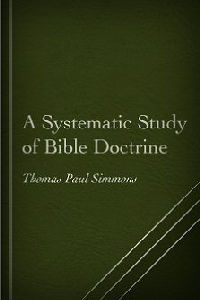Adam Clarke Commentary(1762-1832)
A good commentary by a Methodist minister.
Adam Clarke was the most famous commentator the Methodist Church ever produced. As a child he was judged to be rather dull; however, from about eight onward he began to excel in learning. Though his father was of the Church of England, and his mother a Presbyterian, he became a Methodist when he was about sixteen. As his studies progressed he became a master of both Hebrew and Greek, as well as several other languages. He was proficient in the Greek classics, patristic literature, and various disciplines of history and science.

T.R. Simmons A Systematic Study of Bible Doctrine is a Bible Doctrines book of 43 chapters. The author is (according to the Introduction) "systematic, Calvinistic, Baptist, and premillennial". I am offering this work in various formats:
PDF: Simmons A Systematic Study of Bible Doctrine.pdf
Microsoft Word DOCX: Simmons A Systematic Study of Bible Doctrine.docx
OpenOffice ODT: Simmons A Systematic Study of Bible Doctrine.odt
EPUB: Simmons A Systematic Study of Bible Doctrine.epub
theWord: Simmons A Systematic Study of Bible Doctrine.twm
eSword: Simmons A Systematic Study of Bible Doctrine.topx
MySword: Simmons A Systematic Study of Bible Doctrine.mybible
Clarke labored for forty years to bring to completion his erudite eight-volume work (now available in three volumes), A Commentary on the Bible. His studies were so rigorous that he eventually wore himself out in these pursuits. Though his commentaries are not held in high regard today by modern “stuffy” scholars, and while they are obsolete in certain areas, nonetheless, they still contain a wealth of information and should be in every preacher’s library.
In spite of his vast knowledge, Clarke held some very “quirky” ideas. For example, he wrote: “There is scarcely any doubt now remaining in the philosophical world that the moon is a habitable globe.” He described this “lesser light” as a place of mountains, valleys, rivers, lakes and seas, and he believed that the moon is inhabited by intelligent beings.
Additionally, Clarke speculated that the “serpent,” used by Satan as an instrument by which to approach Eve (Gen. 3), was a creature of the “ape” family. The New Testament, of course, indicates that the “serpent” was a snake (ophis), a limbless reptile (cf. Mk. 16:18; cf. 2 Cor. 11:3; Rev. 12:9; 20:2).
Clarke also entertained the bizarre notion that Judas Iscariot did not commit suicide, as our common translations indicate in Matthew 27:5. Rather, the learned gentleman ventured the opinion that Judas was stricken with remorse over having betrayed the Lord. His mental anguish became so acute that he was seized with “violent dysentery.” He got choked, fell off of a seat upon which he was sitting, and his bowels gushed out.
Clarke further attempted to argue that Judas sincerely repented of his betrayal of Christ, and that the Bible student may entertain every hope that the traitor will enjoy eternity in heaven. Of course the evidence is clear that Judas hanged himself. The verbapagcho, in the middle voice, means precisely that, “to hang oneself.” The same term is used to describe the death of Ahithophel in the Greek version of the Old Testament (2 Sam. 17:23). Moreover, Judas was described by Christ as the “son of perdition” (i.e., worthy of perdition; cf. 2 Thes. 2:3) who “perished” (Jn. 17:12). And Peter noted that the wayward apostle “fell away” and went to his “own place” (Acts 1:25), i.e., the place of which he was deserving.
More Modules from Commentary Category
- Bellett, J.G. – Brief Notes on the Epistle to the Ephesians
- Bellett Paul’s Apostleship and Epistles
- Bellett Minor Prophets
- Barnes Albert – Commentary
- Aycock Nightingale of the Psalms
- Alford, H. – Great Greek Commentary
- Alexander, W. – The Epistles of St. John: 21 Discourses
- Ainsworth, P. – The Threshold of Grace
- Adeney, W.F. – Ezra, Nehemiah, and Esther
- Abbott Illustrated NT Commentary

fam30 what does it mean to be a man of God? explores what is a man of God, looking at his character and faithfulness.
Topics: Settling yourself in Sound Doctrine | He is not Worldly in Finances | A Vision for the Heavenly | Justice | Piety | Faith | Love | Patience | Meekness.
Read the Tract: fam30 what does it mean to be a man of God?
MySwordmodules is a website dedicate to the MySword Bible Program for Androird devices. We host MySword Modules.

Buy me Steak Taco! You know, I work hard at my websites trying to provide you with good material that is sound doctrinally-speaking and of interest to God's people. It is hard work, but I don't mind doing it, and I feel called to the ministry, and God will bless me after all is said and done. But in the meantime, I do need to cover my expenses. I have a total of 34 websites (half English and half Spanish), and each one costs about $10 per month to keep up. That does not take into consideration my time and effort in writing content. Won't you consider at least a one time donation to this ministry of $10 or $20 dollars? It would be really great if you could gift me and my wife this money so that we could enjoy eating out at least once in a while. (I pay the expenses for these sites out of our living expenses.) God will richly bless you and repay you for your generosity. 1 Timothy 5:18 For the scripture saith, Thou shalt not muzzle the ox that treadeth out the corn. And, The labourer is worthy of his reward. If you received some value from my websites, consider at lest a small donation. A big donation would really be nice, too though.
Donate to David Cox Ministries.

Thanks for this module, I had this on my pocket e-sword. I was looking for it.